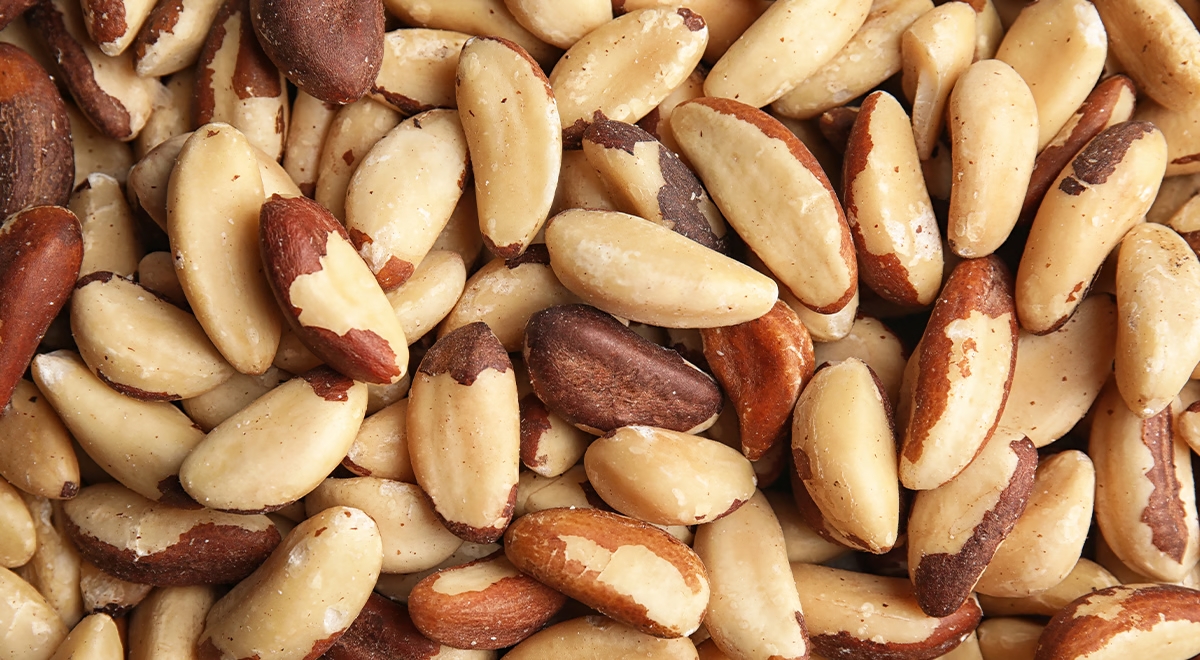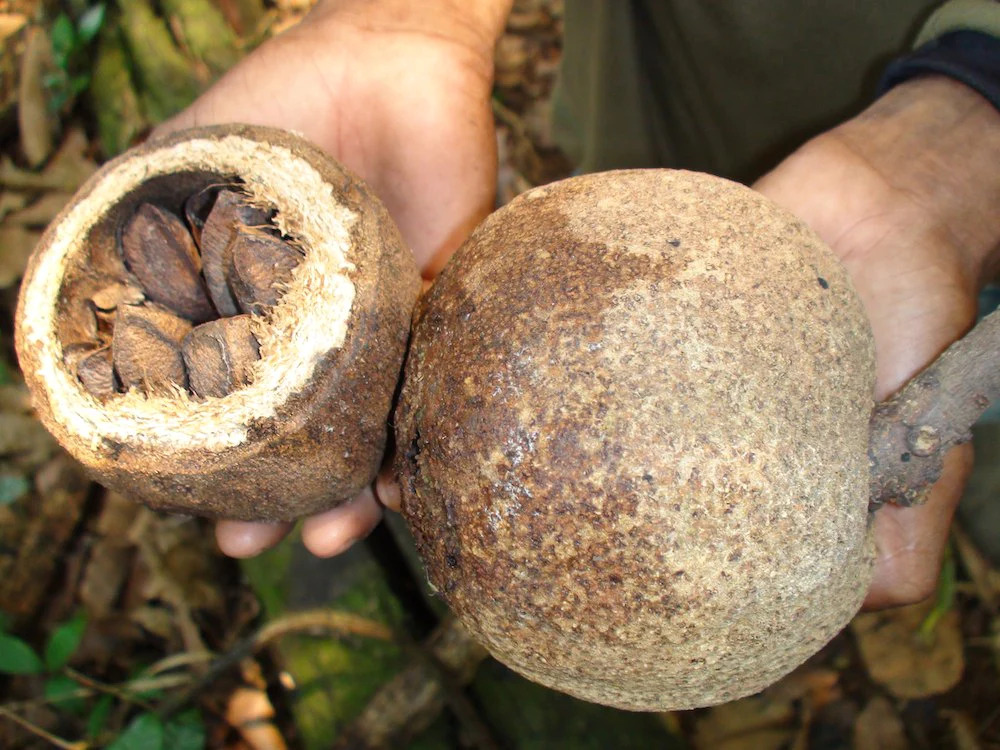Origin and Harvesting
Brazil nuts are seeds from the Brazil nut tree, which is native to the South American Amazon rainforest. They are known for their large size, rich flavor, and high nutritional value. Brazil nuts are often consumed raw or roasted and are a popular snack due to their creamy texture and slightly sweet taste.
These nuts are an excellent source of several nutrients, including selenium, which is important for thyroid function and immune system health. They also provide good amounts of magnesium, phosphorus, and thiamine (vitamin B1). However, due to their high selenium content, it's recommended not to consume them excessively to avoid selenium toxicity.
In addition to being eaten as a snack on their own, Brazil nuts are also used in various recipes, including baked goods, granola, and desserts. They can also be chopped and sprinkled over salads or added to trail mixes for an extra boost of flavor and nutrition.

Nutritional Profile
Selenium Content
One of the most notable aspects of Brazil nuts is their exceptionally high selenium content. Selenium is a trace mineral crucial for various bodily functions, including thyroid health, immune system function, and antioxidant activity. Just one Brazil nut can provide well over 100% of the recommended daily intake of selenium.
Other Nutrients
In addition to selenium, Brazil nuts are rich in other essential nutrients such as magnesium, phosphorus, and thiamine (vitamin B1). These nutrients play vital roles in maintaining overall health and well-being.
Health Benefits
Thyroid Function
Selenium is particularly important for thyroid function, as it helps regulate the production of thyroid hormones. Adequate selenium intake can support thyroid health and contribute to a balanced metabolism.
Heart Health
The combination of selenium, magnesium, and healthy fats in Brazil nuts may promote heart health by reducing inflammation, improving cholesterol levels, and supporting proper blood vessel function.
Antioxidant Properties
Brazil nuts contain antioxidants like selenium and vitamin E, which help neutralize harmful free radicals in the body, reducing the risk of chronic diseases and slowing down the aging process.
Potential Risks
Selenium Toxicity
While selenium is essential in small amounts, consuming too much can lead to selenium toxicity, which can cause symptoms such as nausea, vomiting, hair loss, and nerve damage. It's crucial to consume Brazil nuts in moderation to avoid selenium overdose.
Allergic Reactions
Despite being called "nuts," Brazil nuts are technically seeds and are less likely to trigger nut allergies. However, some individuals may still be allergic to them, so caution is advised, especially for those with known nut allergies.
Culinary Uses
Brazil nuts are incredibly versatile and can be enjoyed in various ways:
Snack
Brazil nuts are delicious when eaten raw or roasted as a snack. Their creamy texture and slightly sweet flavor make them a satisfying and nutritious option for curbing hunger between meals.
Recipe Ingredient
These nuts can also be used in cooking and baking, adding a rich, nutty flavor and a nutritional boost to dishes such as salads, granola, trail mixes, and desserts.
Sustainability
The sustainability of Brazil nut production is crucial for the preservation of the Amazon rainforest and the livelihoods of indigenous communities who depend on it. Sustainable harvesting practices, along with efforts to protect the rainforest, are essential for ensuring the long-term availability of this valuable resource.
Potential Harms
Selenium Toxicity
While selenium is essential in small amounts, consuming too much can lead to selenium toxicity, which can cause symptoms such as nausea, vomiting, hair loss, and nerve damage. It's crucial to consume Brazil nuts in moderation to avoid selenium overdose.
Allergic Reactions
Despite being called "nuts," Brazil nuts are technically seeds and are less likely to trigger nut allergies. However, some individuals may still be allergic to them, so caution is advised, especially for those with known nut allergies.
Culinary Uses
Brazil nuts are incredibly versatile and can be enjoyed in various culinary applications. They can be eaten raw or roasted as a snack, added to salads, granola, or trail mixes, and used as an ingredient in various recipes, including desserts and baked goods.
Sustainability
The sustainable harvesting of Brazil nuts is essential for the preservation of the Amazon rainforest and the livelihoods of indigenous communities who depend on it. By supporting sustainably sourced Brazil nuts, consumers can contribute to the conservation of this valuable ecosystem.
Brazil Nut Production
The production process of Brazil nuts begins with the harvesting of the nuts from the large, spherical pods that grow on the Brazil nut tree. Harvesting is typically done by local communities, often indigenous people who have specialized knowledge of the forest and its resources. These communities rely on Brazil nut harvesting as a source of income and a way of life.

Harvesting Brazil nuts is a labor-intensive process that requires careful attention to detail. The pods, which can weigh up to 2 kilograms each, are collected from the forest floor once they have fallen naturally from the trees. The nuts are then extracted from the pods and sorted before being transported to processing facilities.
The annual Brazil nut production varies depending on various factors such as weather conditions, tree health, and harvesting practices. However, on average, Brazil nut production ranges between 40,000 to 60,000 metric tons per year globally.
Conclusion
In conclusion, Brazil nuts offer a plethora of health benefits, thanks to their rich nutrient profile and antioxidant properties. However, it's essential to consume them in moderation to avoid potential harms, such as selenium toxicity. By incorporating Brazil nuts into a balanced diet, individuals can enjoy their delicious flavor while reaping the rewards of their nutritional goodness.
FAQs
-
How many Brazil nuts should you eat per day?
- While there is no set recommendation, consuming 1-2 Brazil nuts per day can provide ample selenium without risking toxicity.
-
Can Brazil nuts help with weight loss?
- While Brazil nuts are nutrient-dense and can be part of a healthy diet, they are calorie-dense, so portion control is essential for weight management.
-
Are Brazil nuts safe for people with nut allergies?
- While Brazil nuts are seeds and less likely to trigger nut allergies, individuals with known nut allergies should exercise caution and consult with a healthcare professional.
-
How can you incorporate Brazil nuts into your diet?
- You can enjoy Brazil nuts as a snack on their own, or incorporate them into recipes such as salads, granola, and desserts for added flavor and nutrition.
-
Are there any environmental concerns related to Brazil nut production?
- Sustainable harvesting practices are essential to minimize the environmental impact of Brazil nut production and preserve the biodiversity of the Amazon rainforest.

You must be logged in to post a comment.